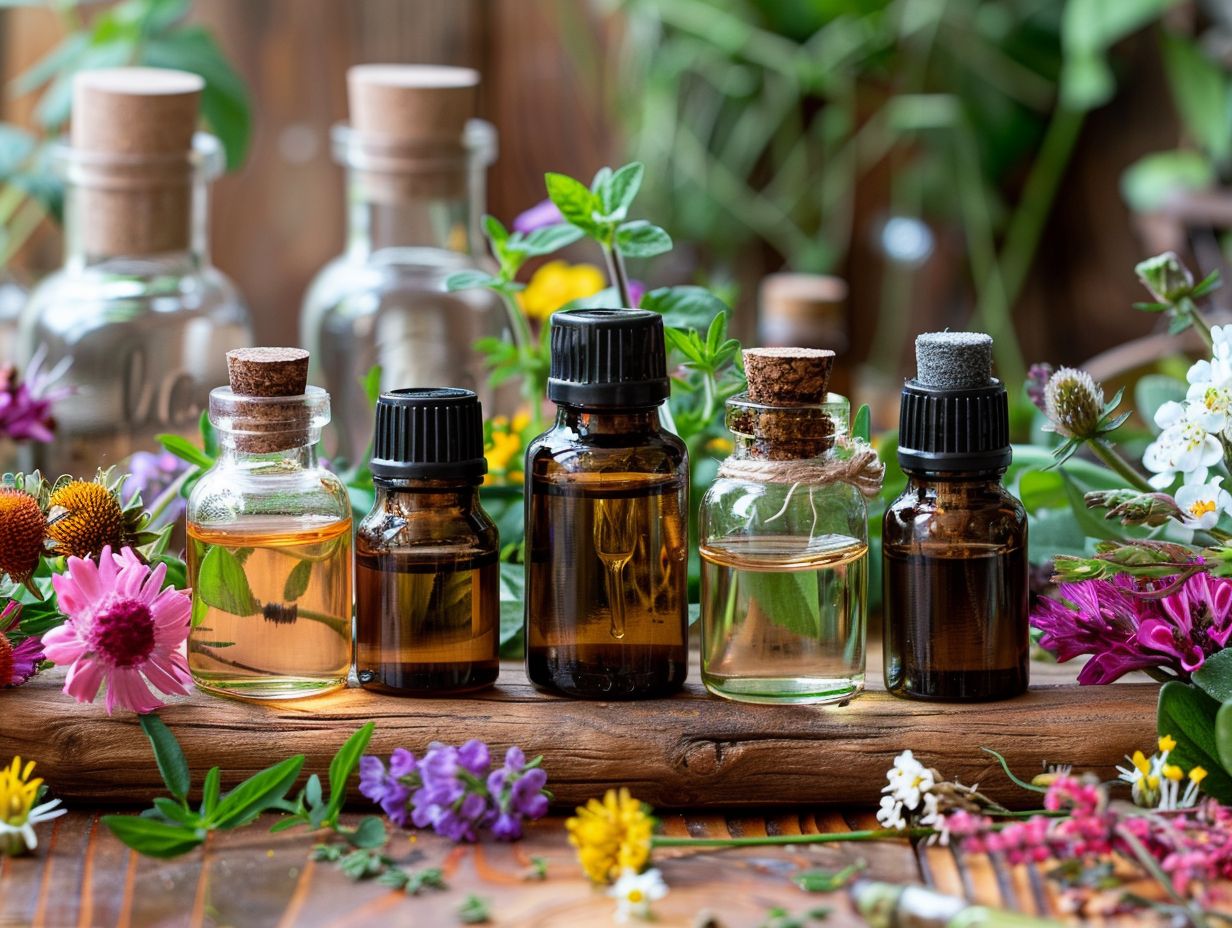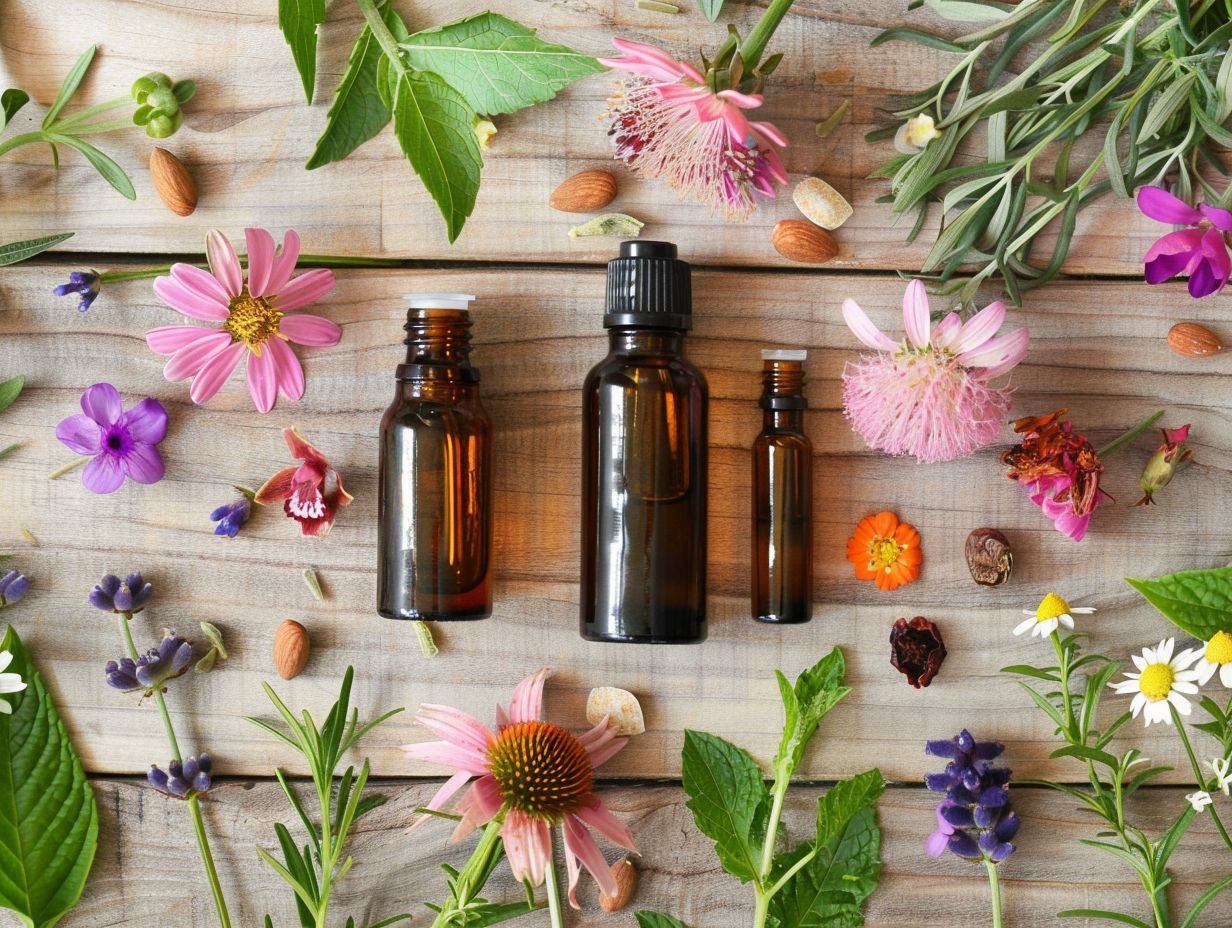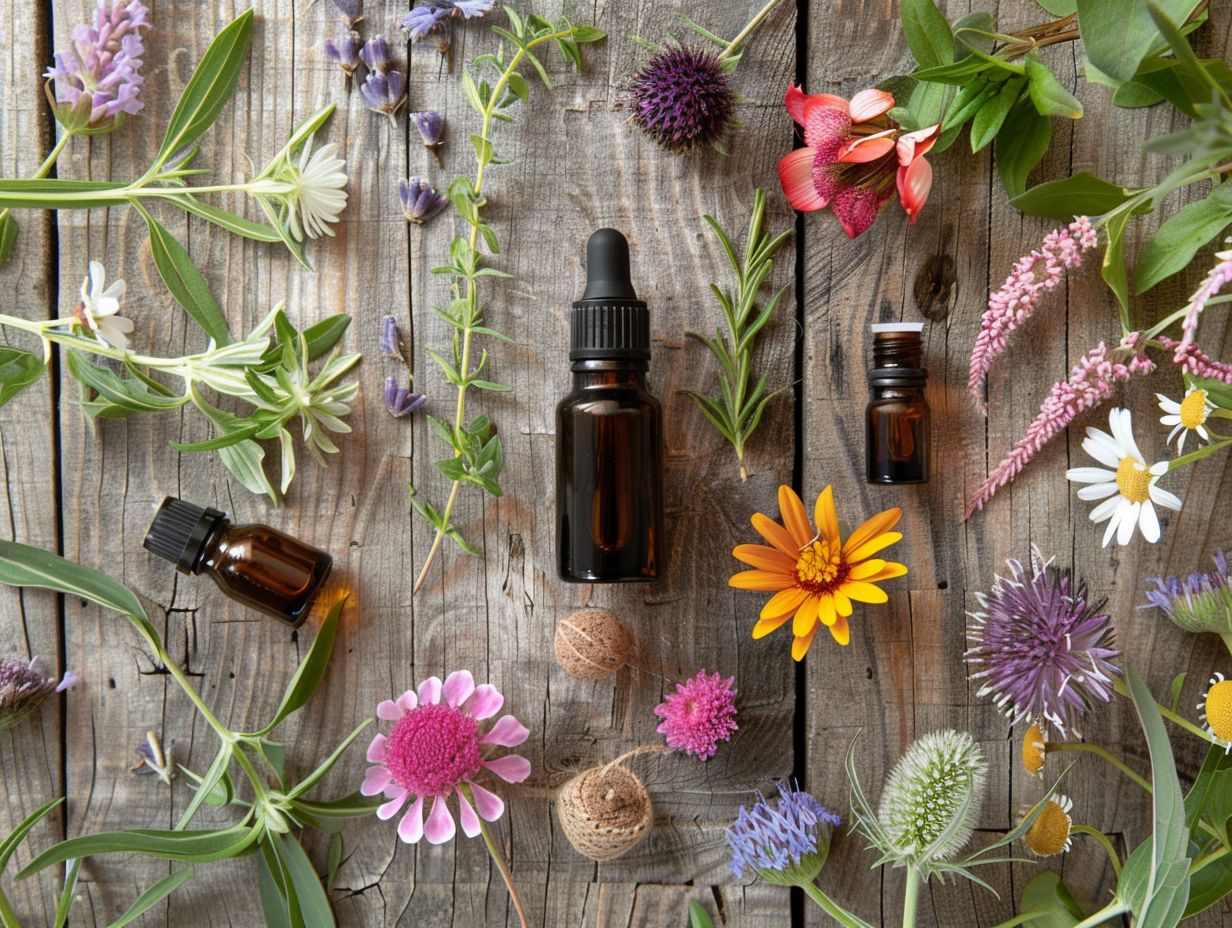What Essential Oils Are Good for Allergies
Essential oils have gained popularity for their health benefits, including their ability to alleviate allergies.
We explore essential oils, how they can help combat allergies, common allergens, anti-inflammatory properties, and immune system support.
Discover the best essential oils for allergies, how to use them effectively, and potential risks and side effects.
If you’re interested in using essential oils for allergies, read on to learn more.
Key Takeaways:
What Are Essential Oils?
Essential oils are concentrated liquids extracted from plants that capture the plant’s scent and flavor or ‘essence.’ These oils are often used in aromatherapy, beauty products, and for various health benefits.
Essential oils have been used for centuries for their therapeutic properties and healing effects. The extraction process varies depending on the plant, with methods like steam distillation, cold pressing, or solvent extraction commonly employed.
Lavender, known for its calming properties, is used to promote relaxation and improve sleep quality.
Peppermint oil is popular for its refreshing scent and may help alleviate headaches and aid digestion.
Lemon oil is often used for its uplifting aroma and potential antibacterial properties, ideal for cleaning products.
Eucalyptus oil is favored for its respiratory benefits, commonly used in inhalers for cold and flu relief.
What Are Allergies?
Allergies are the body’s immune system reacting to substances that are usually harmless. These substances can trigger allergic reactions in some individuals, leading to symptoms such as sneezing, itching, or hives.
Respiratory allergies affect the airways and can cause symptoms like coughing, wheezing, and shortness of breath. Common triggers for respiratory allergies include pollen, dust mites, and pet dander.
On the other hand, skin allergies manifest as rashes, redness, or swelling on the skin due to contact with allergens like certain fabrics, soaps, or metals.
Using essential oils like lavender, peppermint, lemon, and eucalyptus can help alleviate allergy symptoms. Lavender oil has calming properties, while peppermint oil can aid in relieving congestion. Lemon oil acts as a natural antihistamine, and eucalyptus oil may help reduce inflammation in the airways.
What Are the Common Allergens?
Common allergens include pollen, dust mites, pet dander, mold, and certain foods. When these allergens come into contact with the body, the immune system can react, leading to various allergic reactions.
For individuals with sensitivity to pollen, exposure can result in symptoms like sneezing, itchy eyes, and congestion. Dust mites, commonly found in bedding and upholstery, can trigger asthma attacks or skin rashes. Pet dander, consisting of tiny skin particles shed by animals, often causes respiratory distress. Mold spores present a risk indoors and outdoors, provoking coughing and wheezing. Certain foods, such as peanuts, shellfish, and dairy products, may cause digestive issues or skin hives.
How Do Essential Oils Help with Allergies?
Essential oils can help with allergies by reducing inflammation, supporting the immune system, and providing relief from allergy symptoms naturally. Their aromatic properties and therapeutic benefits make them effective in managing allergic reactions.
When inhaled or applied topically, essential oils target the root cause of allergies by calming the body’s inflammatory response. Certain oils like colds essential oils lavender, eucalyptus, and peppermint possess anti-inflammatory properties that can soothe irritated airways and sinuses, reducing congestion and helping to clear nasal passages.
Essential oils can boost the immune system, enabling the body to defend itself against allergens more effectively. Oils like tea tree and lemon have antimicrobial properties that can help combat infections and support overall immune function.
By utilizing the strength of plant-based medicine, essential oils offer a natural alternative to traditional allergy treatments. The calming and soothing scents of oils such as chamomile and frankincense can provide relief from allergy symptoms like sneezing, itching, and congestion, promoting a sense of well-being and comfort.
What Are the Anti-inflammatory Properties of Essential Oils?
Essential oils such as lavender, peppermint, and eucalyptus possess potent anti-inflammatory properties that can help reduce swelling, redness, and discomfort associated with allergic reactions.
These essential oils work by inhibiting the production of pro-inflammatory compounds in the body, thus serving as natural remedies for managing allergic responses.
- Lavender oil aids in soothing irritated skin and reducing inflammation, making it beneficial for conditions like eczema and dermatitis.
- Peppermint oil contains menthol, which has cooling effects and can alleviate itching and inflammation on the skin.
- Eucalyptus oil is renowned for its decongestant properties, helping clear respiratory pathways and reduce inflammation in conditions like sinusitis.
Incorporating these oils into your wellness routine can offer relief from allergies and promote overall well-being.
How Do Essential Oils Support the Immune System?
Essential oils support the immune system by promoting a healthy response to allergens, helping the body adapt to environmental triggers, and strengthening overall immune function.
When incorporated into daily routines, essential oils like lemon and eucalyptus can provide a natural boost to the body’s defense mechanisms.
Lemon essential oil, known for its refreshing scent, contains compounds that exhibit antimicrobial properties, aiding in fighting off pathogens and enhancing the immune response.
Eucalyptus oil, with its invigorating aroma, has properties that support respiratory health, making it an excellent choice for bolstering the body’s defenses against common environmental triggers.
These oils work synergistically to improve immune function and fortify the body’s ability to ward off unwanted invaders.
Which Essential Oils Are Good for Allergies?

Peppermint oil is known for its cooling effect and can help in reducing congestion and soothing inflamed nasal passages. Lavender oil possesses anti-inflammatory properties that can calm irritated skin or respiratory systems. Eucalyptus oil acts as a natural decongestant and can facilitate easier breathing by clearing the airways.
- Tea tree oil is antiseptic and can help in disinfecting areas affected by allergic reactions, preventing further infection.
- Lemon oil is rich in antioxidants, promoting a healthy immune response and aiding in detoxification processes.
Peppermint Oil
Peppermint oil is known for its cooling sensation and ability to improve breathing. It can help clear sinuses, reduce congestion, and ease respiratory allergy symptoms when used in aromatherapy or topically.
Apart from its respiratory benefits, peppermint oil also possesses anti-inflammatory properties that can alleviate inflammation in the sinuses, providing relief from sinus pressure and discomfort. The inhalation of peppermint oil can also promote a sense of relaxation and mental clarity, making it a great natural remedy for those struggling with allergic reactions. The refreshing scent of peppermint oil can open up airways, making it easier to breathe, especially when dealing with congestion caused by allergies.
Lavender Oil
Lavender oil is renowned for its calming and soothing properties, making it effective in reducing inflammation, soothing skin allergies, and promoting relaxation. Its aroma can also provide relief from respiratory allergy symptoms.
The anti-inflammatory effects of lavender oil stem from its compounds that help to reduce swelling and redness in irritated skin, making it a popular choice for those dealing with skin allergies. Its skin-soothing properties can help alleviate itching and discomfort associated with allergic reactions.
When used in aromatherapy, the scent of lavender oil can help relax the mind and body, contributing to its role in promoting relaxation. Inhaling lavender oil vapors can help ease congestion and respiratory discomfort, providing relief for those suffering from respiratory allergies.
Eucalyptus Oil
Eucalyptus oil is known for its decongestant and expectorant properties, making it beneficial for respiratory allergies. It can help clear airways, reduce inflammation, and provide relief from sinus congestion.
Inhalation of eucalyptus oil is particularly effective in managing respiratory issues. When inhaled, the oil’s vapors reach the respiratory tract, where they work on clearing mucus and reducing inflammation. The natural properties of eucalyptus oil help to soothe irritated airways, making breathing easier for individuals with allergies. Its expectorant nature facilitates the removal of excess mucus, aiding in relief from congestion.
Tea Tree Oil
Tea tree oil is known for its antimicrobial and anti-inflammatory properties, making it effective in treating skin allergies and soothing skin irritations. It can also help prevent infections and promote skin healing.
Tea tree oil, derived from the Melaleuca alternifolia plant, has been used for centuries for its medicinal properties. Its ability to combat bacteria, fungi, and viruses makes it a popular natural remedy for various skin conditions, including allergic reactions.
When applied topically, tea tree oil helps reduce inflammation, itching, and redness associated with skin allergies. It also acts as a barrier, protecting the skin from potential infections that may arise from allergic reactions. The oil’s healing properties support the regeneration of skin cells, aiding in the faster recovery from skin irritations.
Lemon Oil
Lemon oil is known for its cleansing and detoxifying properties, which can help support the immune system and provide relief from seasonal allergies. Its fresh scent can uplift mood and promote respiratory health.
When used in aromatherapy, lemon oil is believed to have a clarifying effect on the mind, helping to reduce stress and anxiety levels. Inhaling the aroma of lemon oil can also aid in improving concentration and focus, making it a popular choice for those needing an extra mental boost. Its antimicrobial properties make it a valuable ally in combating respiratory infections, coughs, and colds. Whether diffused, inhaled, or applied topically, lemon oil serves as a versatile and beneficial essential oil for overall well-being.
How to Use Essential Oils for Allergies?
Essential oils can be used for allergies through inhalation, topical application, and diffusion. Each method offers unique benefits for managing allergy symptoms naturally and effectively.
Inhalation: Inhaling essential oils through methods like steam inhalation or using a diffuser can provide quick relief by clearing nasal passages and reducing congestion. Topical application involves diluting essential oils with a carrier oil before applying to the skin to help alleviate allergy symptoms like redness and itching. Diffusing essential oils in the air not only freshens the space but also helps in purifying the air and promoting overall respiratory health.
Inhalation

When inhaled, these essential oils travel to the sinus cavities, where their anti-inflammatory properties can provide relief from congestion and irritation. Essential oils like lavender are known for their calming effects, which can also help in reducing stress that may exacerbate allergy symptoms. Eucalyptus oil, on the other hand, has decongestant properties that can effectively open up airways for easier breathing.
Topical Application
Topical application of essential oils involves diluting them with a carrier oil and applying them to the skin. Oils like tea tree and peppermint can soothe skin allergies, reduce redness, and provide relief from itching.
Diluting essential oils in a carrier like coconut or jojoba oil helps prevent skin irritation and sensitization. The process allows the potent properties of oils like tea tree and peppermint to be safely absorbed by the skin, targeting the root cause of allergies. Regular application of these oils can help maintain skin health and reduce the frequency of allergic reactions. Their natural anti-inflammatory and antimicrobial properties promote skin healing and prevent further irritation. Remember to always perform a patch test before full application to ensure no adverse reactions.
Diffusion
Diffusing essential oils in a diffuser can help purify the air and create a calming environment. Oils like lemon and lavender can provide relief from seasonal allergies when diffused.
When you diffuse essential oils like lemon and lavender, you not only freshen the air but also combat allergens that trigger discomfort. Lemon oil acts as a natural cleanser, killing germs and purifying the atmosphere, making it easier for allergy sufferers to breathe easier.
Lavender, on the other hand, is renowned for its calming properties, which can help reduce stress and promote relaxation, thereby alleviating allergy symptoms related to heightened anxiety levels. The gentle fragrance of lavender can also soothe irritated airways and provide a sense of ease to those struggling with seasonal allergies.
Ingestion (under the guidance of a healthcare professional)
Ingesting essential oils should only be done under the guidance of a healthcare professional due to the concentrated nature of oils. It is essential to understand the correct dosage and safety precautions when considering ingestion.
Healthcare professionals can provide valuable insights on how essential oils may interact with existing medications or conditions. They can also help determine the appropriate amount to consume and whether ingestion is the best method of utilizing the oils. Without proper guidance, there is a risk of allergic reactions, gastrointestinal issues, or other adverse effects.
Are There Any Risks or Side Effects of Using Essential Oils for Allergies?
While essential oils offer natural relief for allergies, there are risks and side effects to consider. These may include skin irritation, allergic reactions, and possible interactions with medications.
It’s crucial to understand that essential oils, though natural, can be potent and may cause skin irritation if not properly diluted. Individuals with sensitive skin are particularly at risk.
Allergic reactions to essential oils are also possible, even in individuals who do not have known allergies. Symptoms may range from mild skin redness to more severe breathing difficulties requiring immediate medical attention.
Antihistamines may provide relief for mild reactions, but severe cases may necessitate medical treatment.
Skin Irritation
Skin irritation can occur when essential oils are applied topically in their undiluted form. It is essential to perform a patch test and dilute oils properly to prevent adverse reactions.
When using essential oils, always remember that these concentrated plant extracts should not be directly applied to the skin without proper dilution. This is because the potent nature of essential oils can lead to irritation, redness, or even burns if not used correctly. To minimize the risk of skin reactions, mix the essential oil with a carrier oil like sweet almond or coconut oil before application. Additionally, patch testing is crucial to check for any allergic reactions or sensitivities. Apply a small amount of diluted oil to a small area of skin and wait 24 hours to observe any adverse effects before using it more extensively.
Allergic Reactions
Some individuals may experience allergic reactions to certain essential oils, leading to symptoms like rash, itching, or respiratory distress. It is crucial to identify allergens and discontinue use if adverse reactions occur.
Allergic reactions to essential oils can manifest in various ways, affecting the body differently depending on the individual’s sensitivity.
Skin reactions are common, presenting as redness, hives, or blisters. In more severe cases, respiratory reactions such as coughing, wheezing, or even shortness of breath may occur. Recognizing these signs promptly is essential for seeking proper relief and preventing the escalation of symptoms.
By pinpointing the specific trigger, individuals can better manage their allergies and protect themselves from potentially serious reactions.
Interactions with Medications

Some essential oils, like lavender and peppermint, possess natural compounds that may influence enzymes responsible for metabolizing medications in the body. This can lead to unexpected interactions or compromised absorption of the prescribed drugs.
For instance, if you are using a diffuser to disperse essential oils into the air, these aromatic molecules can potentially affect the way certain medications work within your system. Understanding how essential oils interact with your immune system and medications is essential to maintaining your well-being.
The Diffuser World recommends consulting with a qualified healthcare professional to receive personalized guidance on incorporating essential oils into your daily routine safely.
The FDA advises caution when using essential oils alongside medications, highlighting the potential risks if not managed properly.
When Should One Consult a Healthcare Professional When Using Essential Oils for Allergies?
It is advisable to consult a healthcare professional before using essential oils for allergies, especially if you have underlying health conditions, are pregnant, or are taking medications that could interact with the oils.
Essential oils can be powerful remedies for allergies, but due to their concentrated nature, it’s crucial to seek medical advice to ensure safe and effective usage.
A healthcare provider can offer personalized guidance based on your specific health needs and potential risks associated with essential oils.
For individuals with respiratory issues, such as asthma, seeking professional advice is essential to prevent any adverse reactions or exacerbation of symptoms.
Frequently Asked Questions
What Essential Oils Are Good for Allergies?
There are several essential oils that are known for their anti-allergic properties. Some of the most effective ones include peppermint, eucalyptus, lavender, tea tree, and chamomile.
How Do Essential Oils Help with Allergies?
Essential oils contain natural compounds that have anti-inflammatory and decongestant properties, helping to reduce allergic reactions and symptoms such as congestion, sneezing, and itching.
Can Essential Oils Be Used to Prevent Allergies?
Yes, certain essential oils are known for their immune-boosting properties, which can help prevent allergic reactions by strengthening the body’s defenses against allergens.
Are There Any Side Effects of Using Essential Oils for Allergies?
When used correctly and in moderation, essential oils are generally safe and have minimal side effects. However, it is important to dilute them properly and to patch test before using them topically.
How Should I Use Essential Oils for Allergies?
Essential oils can be used topically by diluting them with a carrier oil and applying them to the skin, or by inhaling them through a diffuser or steam inhalation. It is important to follow proper dilution guidelines and consult a healthcare professional before use.
Can Children and Pregnant Women Use Essential Oils for Allergies?
Children and pregnant women should consult with a healthcare professional before using essential oils for allergies. Some oils may not be safe for use during pregnancy, and certain oils may need to be used with caution for children.








One Comment